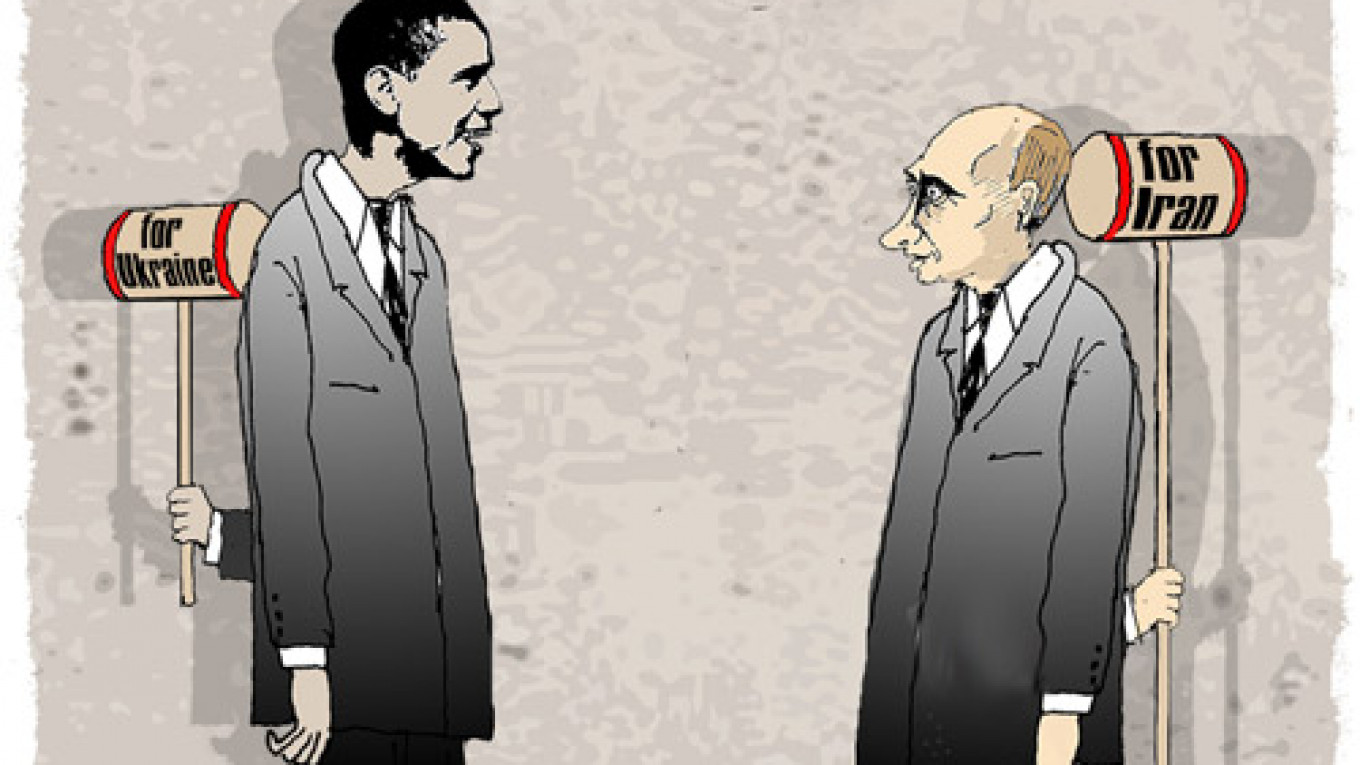The war drums are once again beating in Washington. An attention-grabbing report released by three of America's leading think tanks recommends that the United States save Ukraine by arming it. The U.S. government, the report argues, should alter its policy and begin providing lethal assistance to Ukraine's military — $3 billion over the next three years. That is serious money.
The rationale used by Washington's legion of escalation focuses on the notion of "raising the costs for Putin." If Kiev had advanced weaponry, so the argument goes, it would be able to inflict higher casualties on the Russian troops Putin has apparently sent into the Donbass to support the separatists there. Boiled down to its essence then, the idea is that an increase in Russian soldiers coming home from Ukraine in body bags will force Putin to back down to prevent a domestic backlash.
While it is easy to see the seductive simplicity of this reasoning, let's not forget that if the U.S. raises the ante, Putin will almost certainly do the same in Ukraine and elsewhere. First and foremost, the pro-escalation argument greatly underestimates the lengths Putin would be willing to go to in Ukraine.
Since the first stirrings on Kiev's Maidan, the West has consistently overlooked the tremendous importance of Ukraine to Russia. Russia views Ukraine similarly to how China looks at Taiwan: as an existential issue in which certain red lines must not be crossed.
For Putin, the overthrow of former Ukrainian President Viktor Yanukovych risked opening the door for Ukraine to join NATO and the Western alliance system — something which Moscow could not and will never accept. All of Putin's moves since then have been intended to prevent this.
Once we understand that Ukraine's status is an existential issue for Moscow, it is clear that Putin will never allow the separatists to be defeated — and indeed Russia possesses the military might to ensure that this never happens. In this regard, Putin possesses what analysts referred to during the Cold War as "escalation dominance," described by American nuclear strategist Herman Kahn as "a capacity, other things being equal, to enable the side possessing it to enjoy marked advantages in a given region of the escalation ladder."
Put simply, in Ukraine Putin enjoys escalation dominance at every level of the potential military escalation chain, and no amount of wishful thinking will change this fact.
Consider what happened in late August when it appeared as though the Ukrainian military might rout the separatists. In response to Kiev's escalation, Putin escalated as well, sending in enough Russian troops and heavy weaponry to inflict a bloody defeat on the Ukrainian forces at Ilovaisk.
Likewise, Putin would almost certainly respond to an increase in Kiev's military capabilities now by doubling down on Russia's military support for the separatists. In a worst-case scenario Russia could perhaps even invade Ukraine outright.
The end result would be even greater death and destruction in the Donbass, with the possibility of a settlement even further away — the exact opposite outcome the West would have intended.
Another fact overlooked by those in favor of arming Kiev is that Putin could choose to escalate asymmetrically, outside of Ukraine. Iran would be the worst case. In late January, Russian Defense Minister Sergei Shoigu visited Iran and signed a military cooperation pact with Tehran.
One item from this trip was particularly alarming. Retired Russian General Leonid Ivashov summarized the Tehran meetings, noting that "a step was taken in the direction of cooperation on the economy and arms technology, at least for such defensive systems as the S-300 and S-400. Probably we will deliver them."
With a radius of 400 kilometers and an ability to shoot down cruise missiles as well as aircraft, the Center for Strategic and International Studies describes the S-400 as "Russia's most advanced air defense system … designed specifically to contest U.S. air superiority." Though Ivashov is a controversial figure, this is dangerous stuff, and in Iranian hands it could potentially change the balance of power in the Middle East.
Russia has been involved in on-again, off-again negotiations to sell these missiles to Iran, first the S-300 and now the S-400. To date, Moscow has held off on actually completing the sale, at least partially so as not to undermine the prospects for the P5+1 to reach a comprehensive nuclear deal with Tehran.
While the focus of the P5+1 has been to achieve a peaceful resolution to the Iranian nuclear crisis, the threat of a U.S. or Israeli military strike on Tehran's nuclear facilities has hung in the background as a possibility if talks fail.
However the Israelis are already distrustful of America's commitment to ending Iran's nuclear program, and if it appeared that Tehran was about to deploy S-400 missiles, the Israelis might well choose to strike Iran unilaterally, plunging the Middle East into a horrific conflict.
For a Kremlin concerned with global stability, a nuclear Iran or a Middle East war is certainly not something Moscow would desire. In the context of Ukraine, however, don't underestimate Putin's willingness to play the Iran card.
Speaking last year after one P5+1 negotiating session in Switzerland, Deputy Foreign Minister Sergei Ryabkov said: "We wouldn't like to use these talks as an element of the game of raising the stakes in Ukraine … but if they force us into that, we will take retaliatory measures here as well."
In this context, before embarking on a policy specifically designed to kill Russian troops with American weapons, Washington well might ask itself the following question: Is the perceived need to confront Putin in Ukraine a more important American national interest than ending the Iranian nuclear crisis?
Moreover, Iran is just one locale where Putin could retaliate for the shipment of American weaponry to Kiev. Moscow could escalate nuclear tensions within Europe too. Russia could start by withdrawing from the Intermediate-Range Nuclear Forces Treaty, a 1987 pact that eliminated all of the United States' and former Soviet Union's nuclear and conventional ground-launched ballistic and cruise missiles with ranges of 500 to 5,500 kilometers.
Russia has already moved 10 nuclear-capable Iskander missiles with a range of 400 kilometers into Kaliningrad, as well as terminated an agreement with Lithuania to provide information to Vilnius about Russian weaponry in Kaliningrad.
The next step — if Russia were to withdraw from the INF pact — would be to explicitly announce that nuclear missiles capable of striking anywhere in Europe were now deployed to Kaliningrad. If Russia and the West are not already involved in a full-scale Cold War, this would certainly do the trick.
U.S. President Barack Obama once described a key criterion guiding his foreign policy as "don't do stupid stuff." Sending billions of dollars in lethal arms to Kiev would violate this maxim in spades.
Josh Cohen is a former USAID project officer involved in managing economic reform projects in the former Soviet Union. He contributes to a number of foreign policy-focused media outlets and tweets at @jkc_in_dc
A Message from The Moscow Times:
Dear readers,
We are facing unprecedented challenges. Russia's Prosecutor General's Office has designated The Moscow Times as an "undesirable" organization, criminalizing our work and putting our staff at risk of prosecution. This follows our earlier unjust labeling as a "foreign agent."
These actions are direct attempts to silence independent journalism in Russia. The authorities claim our work "discredits the decisions of the Russian leadership." We see things differently: we strive to provide accurate, unbiased reporting on Russia.
We, the journalists of The Moscow Times, refuse to be silenced. But to continue our work, we need your help.
Your support, no matter how small, makes a world of difference. If you can, please support us monthly starting from just $2. It's quick to set up, and every contribution makes a significant impact.
By supporting The Moscow Times, you're defending open, independent journalism in the face of repression. Thank you for standing with us.
Remind me later.







